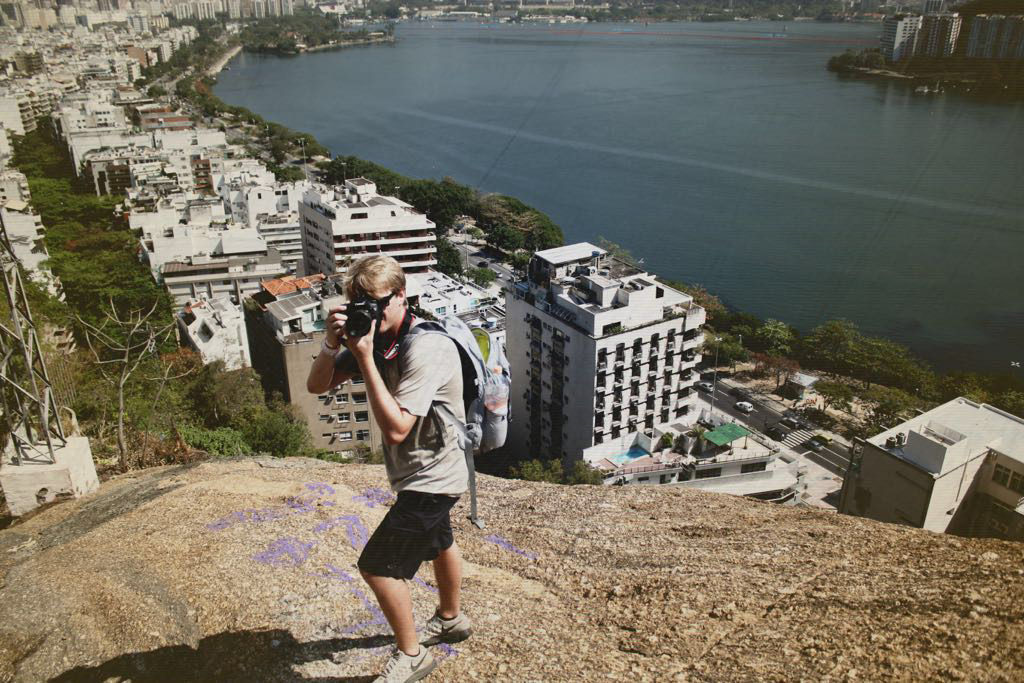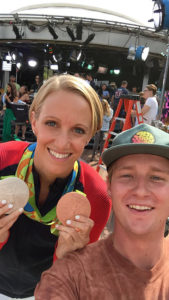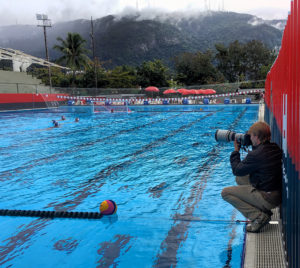A prime assignment for 1 of 25 selected to cover summer games…

Scotty Bara is a senior at Arizona State University majoring in journalism and mass communication. He was one of 25 students accepted into a program to cover the Summer Olympics in Rio de Janeiro. He is posting on Twitter @scottybara. Follow the class posts using #CronkiteRio.
By Bradley Wilson
CMR Managing Editor
What led you to covering the Olympics?
It was always my dream to cover the Olympics. It’s the world’s biggest sporting event and I was in disbelief when I heard I was one of the 25 accepted to the program to cover the games out of the hundreds of students who applied.
When applying to colleges, I heard of the Olympic program at the Walter Cronkite School of Journalism at ASU. I knew I wanted to pursue journalism in college and the Olympics program was a major factor I considered. I followed the school’s coverage of the 2012 London games and was amazed at how much content the student journalists produced over the span of three weeks. I worked hard in my classes to build up my resume at ASU and applied to the program. I went to football, basketball, soccer, water polo, baseball and lacrosse to attempt to master sports photography during my years at the Cronkite School.
How did you prepare for covering the Olympics?
I prepared by reading a lot about Brazil and the issues with the country. Zika, the political situation and the fact that Brazil is a developing country were all factors that I considered when applying to the program. I knew the games would go on despite all the criticism Rio had received. I also took a one-credit cross-cultural awareness class at ASU where I learned about other how to embed yourself in another country. I learned how to deal with culture shock, language barrier and avoiding dangerous situations. I also looked at a lot of legendary Olympic sports photos from past Olympics and studied on how to make an impact with photography.

What has been the most fun aspect of covering the Olympic games so far?
The most fun aspect of covering the games has been some of the journalistic magic moments I’ve experienced. I’ve found that being in the right place at the right time is crucial with the situation that us student journalists are in.
One of the most memorable journalistic magic moments I’ve had was when we were trying to look for a open water swimmer from Holland. She was supposed to meet us outside of the venue after her event for an interview but we could not find her anywhere outside of the venue and she was not answering her phone. We waited for about an hour when we ran into some fans from Hungary. They spoke English and we asked where we could find the swimmer. They pointed us in the right direction and we asked to interview her through the fence. She ran out of the event area and spoke with us about what it’s like to be an Olympian. This was one of those “luck is where preparation meets opportunity” moments, a journalistic magic moment.
From your point of view, “What’s it like to be an Olympian?”
Olympians are treated like Gods here. They get whatever they want it seems, as they deserve it. The Olympic village is incredible I’ve heard. We’ve talked to a bunch of athletes about the village and they’ve seen huge stars like Usain Bolt and Rafael Nadal in the cafeteria. I’ve also heard they have food from all around the World. I wish I had to access to it. Fans stop Olympic athletes anywhere they go for pictures. I feel like a lot of the fans don’t know who the athletes are half the time, but want a picture with them anyway when they’re wearing their country’s Olympic swag.
What has been the biggest challenge so far?
The biggest challenge has been getting access to Olympic athletes. We are student journalists so our press passes only grant us access to the Rio Media Center and the metro. Our press passes are limited so we have to reach out to the public relations representative of each team and athlete and beg them to allow us to go to practice or get an interview. A lot of the time we have had to interview athletes outside of the venues. Security is very tight and they will not let us into any events or venues without approval and an escort.

What do you wish the media would cover but really haven’t done much of?
This city and the Olympics couldn’t be more opposite than what was reported in the U.S. They couldn’t have been more wrong about Zika, security and the Olympic venues. I wish the news would cover the impact that the Olympics will have on the city and the poorest parts in the favelas. I wish media outlets would cover topics like: What will they do with the Olympic venues after the games are over? Or, how has the Olympics impacted the country compared to the World Cup and other major events that have been here?
What are your take-home lessons at this point?
Being at the right place at the right time is extremely important. Getting a good night’s sleep is critical as well. Eating at least two meals a day is crucial. As a field reporter, you’re out all day chasing Olympic athletes, and it’s really easy to forget to eat.
If you had to do it all over again, what would you do differently?
I wish I packed different clothing. The weather is a lot hotter than I thought and the assignments I’ve participated in have been very informal. I could have left that suit and tie at home.
